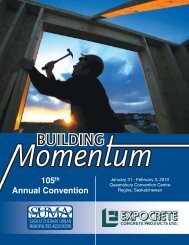Long-term Debt Limits in Saskatchewan - Nipawin
Long-term Debt Limits in Saskatchewan - Nipawin
Long-term Debt Limits in Saskatchewan - Nipawin
Create successful ePaper yourself
Turn your PDF publications into a flip-book with our unique Google optimized e-Paper software.
Table 1.0<br />
Very<br />
dissatisfied<br />
Somewhat<br />
dissatisfied<br />
Neither<br />
satisfied or<br />
dissatisfied<br />
Somewhat<br />
satisfied<br />
Very<br />
satisfied<br />
Responsiveness to your needs 11% (6) 6% (3) 15% (8) 20% (11) 48% (26)<br />
Timely service 11% (6) 20% (11) 17% (9) 20% (11) 31% (17)<br />
Clear communication 7% (4) 9% (5) 17% (9) 22% (12) 44% (24)<br />
Understandable decision-mak<strong>in</strong>g process 9% (5) 6% (3) 15% (8) 28% (15) 43% (23)<br />
Simplicity of applications 9% (5) 20% (11) 17% (9) 28% (15) 26% (14)<br />
report<strong>in</strong>g a growth rate of 25-50%. Growth is a common<br />
factor among the urban governments <strong>in</strong> this prov<strong>in</strong>ce.<br />
Policy Clarity<br />
Dur<strong>in</strong>g the <strong>in</strong>terviews, responsiveness to municipal<br />
requests for debt-limit re-calculations and clarity of rationale<br />
for debt-allocation were reported as challenges <strong>in</strong> the process<br />
for obta<strong>in</strong><strong>in</strong>g debt approval through the SMB. To ga<strong>in</strong> a better<br />
understand<strong>in</strong>g of the urban government perspective on the<br />
SMB, respondents were asked to rate their satisfaction with<br />
the SMB based on past experiences:<br />
As can be seen <strong>in</strong> Table 1.0, no apparent trends emerged,<br />
with respondents report<strong>in</strong>g a mixed level of satisfaction.<br />
On average it should be noted that more respondents were<br />
satisfied than were dissatisfied, which suggests that the<br />
<strong>in</strong>teractions between the SMB and urban governments are<br />
generally positive. However, the mixed level of satisfaction<br />
does suggest that there are areas for improvement accord<strong>in</strong>g<br />
to urban governments <strong>in</strong>terviewed. For example, timely<br />
service and clear communication were two areas where<br />
urban governments would like to see the SMB improve.<br />
Perspectives on Utilities <strong>Debt</strong><br />
The issue of utilities debt has been mentioned as<br />
problematic by some municipalities. To better appreciate<br />
the level of utilities-related debt <strong>in</strong> urban governments <strong>in</strong><br />
<strong>Saskatchewan</strong>, respondents were asked to provide a rough<br />
estimate on the level of municipal debt currently used for<br />
utilities purposes. Over 58% or respondents reported that<br />
less than 25% of debt is currently associated with utilities.<br />
Utilities-related debt does appear to play a significant role <strong>in</strong><br />
the debt of urban governments <strong>in</strong> <strong>Saskatchewan</strong>, but it does<br />
not comprise total debt capacity for the majority of urban<br />
governments: only 27% of respondents report<strong>in</strong>g utilities<br />
related debt of 50% or greater. However, 20% of respondents<br />
did note that utilities-related debt accounted for nearly 100%.<br />
In some cases, utilities debt does appear to be a significant<br />
factor, and this warrants closer <strong>in</strong>vestigation <strong>in</strong>to the reasons<br />
beh<strong>in</strong>d these abnormally high utilities debt levels.<br />
<strong>Debt</strong> Capacity and Growth<br />
Respondents were asked the follow<strong>in</strong>g question: Based<br />
on your expectations for growth, and any planned projects<br />
that you know about, do you believe that the current debt<br />
limit formula for your urban government is sufficient to<br />
meet borrow<strong>in</strong>g needs over the next five years? A number of<br />
important issues and challenges arose from this question.<br />
Reliance on Grants:<br />
Many smaller communities are not eligible for loans to<br />
<strong>in</strong>crease major <strong>in</strong>frastructure because they cannot service<br />
the debt. These small communities are heavily dependent<br />
upon <strong>in</strong>frastructure grants to make any improvements to<br />
<strong>in</strong>frastructure. Some of these municipalities are experienc<strong>in</strong>g<br />
decl<strong>in</strong><strong>in</strong>g populations, or have already seen their populations<br />
shr<strong>in</strong>k considerably.<br />
Infrastructure: Water, Sewer, Roads, and Recreation<br />
The most significant <strong>in</strong>frastructure need reported is<br />
water and sewer <strong>in</strong>frastructure. Most respondents raised the<br />
concern that water and sewer upgrades were very costly, and<br />
would far exceed their municipality’s current debt threshold.<br />
Most of these municipalities would not be able to proceed<br />
with necessary upgrades without <strong>in</strong>creased debt, grant<br />
fund<strong>in</strong>g, or both. The second largest <strong>in</strong>frastructure challenge<br />
is the ma<strong>in</strong>tenance of roads, followed by recreational<br />
<strong>in</strong>frastructure. Both are a challenge, especially for smaller<br />
municipalities.<br />
The Challenges of Growth:<br />
Some municipalities reported that growth <strong>in</strong><br />
population and size of the municipality has placed pressure<br />
on the municipal governments to <strong>in</strong>crease capacity <strong>in</strong><br />
utilities such as water and sewer. One municipality was<br />
experienc<strong>in</strong>g growth of over 400 lots, and needed to upgrade<br />
<strong>in</strong>frastructure to accommodate; entail<strong>in</strong>g a debt <strong>in</strong>crease<br />
beyond current limits.<br />
7






